#i becaming h.g. wells
Text
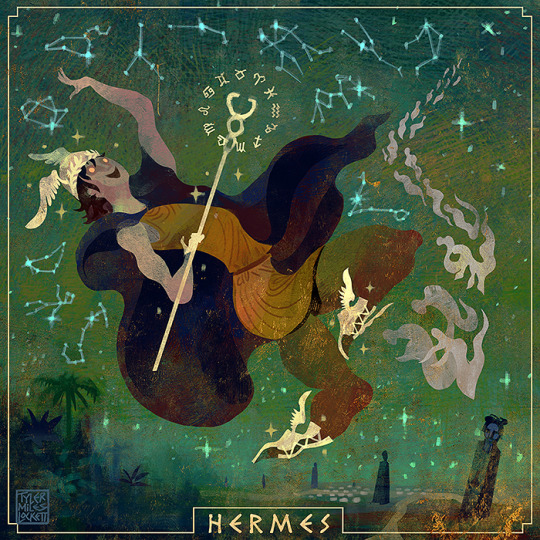
HERMES
“I sing of Cyllenian Hermes, the Slayer of Argus, lord of Cyllene and Arcadia rich in flocks, luck-bringing messenger of the deathless gods. He was born of Maia, the daughter of Atlas, when she had made with Zeus, -- a shy goddess she…. And so hail to you, Son of Zeus and Maia; with you I have begun: now I will turn to another song! Hail, Hermes, giver of grace, guide, and giver of good things! (-Homeric Hymn, translated by H.G. Evelyn white)
HERMES (HUR-meez), is the trickster herald and messenger of the gods, as well as god of diplomacy, commerce, travelers, and trade. He is one of the few deities with the power to move between the earthly and underworld realms. Initially he was portrayed as middle aged with dark beard and long locks, but later he was portrayed as a beardless youth. He created the first musical instruments, the lyre and flute, and, interestingly, was the father of goat legged Pan.
Hermes is a psychopomp; (a leader of spirits into the Underworld.) He also appears as an ally to mortals in a number in myths:. Hermes assists Perseus by providing an adamantine sickle sword to behead Medusa, and in the Odyssey, Hermes assists Odysseus by providing a magic herb to protect the hero against the witchcraft of Circe.
Hermes mother is Maia, one of the PleiadesPleaides, who eventually became constellations. With this ancestry, Hermes has associations with both Astronomy (sky constellations) and astrology (zodiac signs surrounding his herald’s wand). He was also the god of sleep, and could put mortals to sleep or wake them up with his wand. Being the god of travelers and herds, at the bottom we can see stone markers called Herma, and a herd of sheep.
Want to own my Illustrated Greek myth book jam packed with over 130 illustrations like this? Support my book kickstarter "Lockett Illustrated: Greek Gods and Heroes" coming in early 2024. check my bio LINKTREE
#pagan#hellenism#greek mythology#tagamemnon#mythology tag#percyjackson#dark academia#greek#greekmyths#classical literature#percy jackon and the olympians#pjo#homer#iliad#classics#mythologyart#art#artists on tumblr#odyssey#literature#ancientworld#ancienthistory#ancient civilizations#ancientgreece#olympians#greekgods#agamemnon#troy#trojanwar
304 notes
·
View notes
Note
"but my regret here is not quite as bad as my regret that we never got chesterton-penned star trek"
No offense, but I don't think Gene Roddenbury would have been caught dead letting a devout Catholic like Chesterton into Star Trek.
H.G. Wells brought him in. Under a pen name. Gene didn't know it was Chesterton until after it became everyone's favorite episode of all time.
80 notes
·
View notes
Text
Literary
Requested Here!
Pairing: college!Victor Vale x fem!reader (literature student)
Summary: You take it upon yourself to show Victor the beauty of literature.
Warnings: fluff, spoilers and references to: The Outsiders, A Merchant in Venice, Invisible Man, The Hound of the Baskervilles, The Lord of the Rings, An Ideal Husband, The Picture of Dorian Gray, Hamlet, Frankenstein, The Most Dangerous Game, Pride and Prejudice. I also reference some of Schwab's other books
Word Count: 2.5k+ words
Victor Vale Masterlist | Request Info/Fandom List
Picture from Pinterest

Victor is leaning over a book, scribbling notes every few lines.
“What are you reading?” you ask quietly, sitting beside him.
He flips the book up, showing you the cover of one of his many textbooks.
“Hmm. I thought you were actually reading.”
“I am.”
“No, you’re studying.”
“What’s the difference?”
You sigh, shaking your head as you murmur, “Maybe the two different world we lived in weren’t so different. We saw the same sunset.”
Victor ignores you, returning to his notes on adrenal responses.
“Vic, what’s the last book you read?” you ask. “I mean, what’s the last thing you read that wasn’t a textbook, required reading?”
“I think you know.”
“You really need to stop reading your parents’ books, but that’s not my point here. What’s the last fiction piece?”
“I don’t read fiction.”
Your jaw drops, shock evident in your features as you fail to speak. Finally finding your voice, you momentarily forget you’re in a library as your voice raises to repeat, “You don’t read fiction? Why?!”
“Nothing to learn from it,” Victor replies with a shrug.
“Vic.”
He glances at you as a few people whisper for you to be quiet.
“Why read something that isn’t true, that you can’t learn from?” Victor asks.
“Who says you can’t learn from fiction? Just because it didn’t happen doesn’t mean it can’t teach you something. We learn from trees, fish, paintings… literature is no different.”
Victor shakes his head, and as you look at your assigned reading, you realize you must do something.
“Meet me in your dorm after your class tomorrow,” you whisper before standing. “I have a lot to teach you.”
Victor watches you leave, shaking his head before trying to focus again. He has trouble remembering how you became friends sometimes, but then he remembers how you met…
✯✯✯✯✯
1 Year Ago
Someone decided to put Shakespeare on the top shelf. You sigh, looking around to see if anyone is nearby to help you.
“Who puts one of the most-read authors in history up so high?” you ask under your breath.
Stepping back to gauge if you could jump and reach it, you run into someone. Warm hands land on your biceps for a moment before dropping away.
“I’m so sorry,” you apologize.
When you turn around, his arm is over your head.
“Which one?” he asks.
You blink at him, growing distracted, before whispering, “A Merchant in Venice. Please.”
He nods, pulling it off the shelf and lowering it between your chest and his.
“Thank you.”
He nods again and steps back before you rush to introduce yourself.
“Victor,” he offers.
“Nice to meet you, Victor. I’ll see you around.”
His pale brows furrow and you immediately decide you will see him again, no matter what it takes.
✯✯✯✯✯
Present Day
“You’re late,” you chide as Victor enters his dorm.
“How did you get in here?” Victor asks, ignoring your comment.
“Eli keeps a key hidden under the doormat.”
“Idiot,” Victor mumbles.
“I concur, but we’re not here to talk about Eli. In fact, I wish I could forget his name.”
Victor neither agrees nor disagrees, but asks, “What are you here to do?”
You raise your brows, smiling as you tease, “What do you want me to do?”
“I’d like you to leave,” Victor replies flatly. “But it seems unlikely.”
“What and how much had I lost by trying to do only what was expected of me instead of what I myself had wished to do?”
“What is that?”
“Invisible Man, H.G. Wells,” you reply, smiling.
“Why do you make everything about books?”
“Look, I’m here to convince you that fiction, that literature, is beautiful. Vic, there are more lives in literature than we could dream of living; whatever you want to do, learn, be, it’s all in there.”
“Is this going to become another debate on whether pride or prejudice is more detrimental to character development?”
You sigh, looking at the stack of books you brought. Victor watches you, and when he realizes that you’re serious, he removes his trench coat and joins you on the couch.
“You have ten minutes,” Victor tells you.
“Okay, then I get to ask questions, too,” you counter. “So, first, what is your issue with fiction?”
“It’s fake, unbelievable.”
“They don’t have to be about an immortal woman finding her reincarnated lover or parallel earths. Being made up and being unbelievable aren’t inherently connected. Middle-Earth isn’t real, but the imagery makes it realistic.”
“One out of a million, well, I’m convinced,” Victor says, hitting his thighs.
You stretch your arm out past him to stop him from standing. “What kind of fiction did you read before coming to this conclusion?”
“Uh, I remember reading fantasy in middle school.”
Waiting for more, you ask, “And?”
“That’s it.”
Chuckling, you lean toward him. “Literature isn’t about one type of story, Vic. You don’t have to choose a genre and stick to it. No two books are the same because no two people or stories are the same. There isn’t fiction or nonfiction, mysteries or romance, you can read any and everything you want. It’s both/and, not either/or.”
“If your argument is now ‘read what you want to read,’ why can’t I stick to my textbooks?”
You groan, laying your head against Victor’s shoulder. “Because I can’t rest until I help you see why literature is so beautiful and impactful. Why do you think I’m studying it, giving my life to it? Because it changed my life, Victor, and if you give it a chance it can change yours, too.”
“Then what is it you want to do?”
“Is this an invitation?”
Victor sighs as he nods, his shoulder warm from your touch.
“Then, I’m going to teach you and you’re going to be patient and give it a chance.”
“Fine. Where do we start?”
“I mean, your parental trauma is begging for a look at Hamlet, but we’ll ease into it.”
✯✯✯✯✯
You intentionally left a copy of Invisible Man by H.G. Wells on his table when you gathered your things after visiting Victor. While you walk to the library to meet him, you hope he’s read it.
“Hey,” you greet softly.
Victor nods, sliding an anatomy book onto the return shelf.
“Glad I caught you while your friends are busy,” you tease, taking the chair closest to him.
“Alone—it is wonderful how little a man can do alone! To rob a little, to hurt a little, and there is the end.”
“You read it. Even though it’s completely unbelievable and unrealistic?”
“All men, however highly educated, retain some superstitious inklings.”
Your eyes widen as you realize that he not only read it in its entirety but enjoyed it enough to remember it.
“Racism, symbolism, foreshadowing,” Victor lists off. “It wasn’t completely incapable of teaching something.”
“Did you just admit you were wrong?”
“No.”
“So, are you open to more?”
Victor shrugs, and you slide a worn copy of The Hound of the Baskervilles to Victor. He picks it up, touching the cracked spine before looking at you.
“Sherlock is famous,” you answer, smiling brightly.
✯✯✯✯✯
“Stapleton was a deceiver,” Victor says, rushing to your side as you exit class.
“What?” you reply, surprised to see him.
“The hound- it’s a symbol of his deception and the entire time the moor is symbolizing the cloudiness of the mystery because it wasn’t a real mystery. Stapleton’s death was completely avoidable, yet he isn’t even the one to be attacked by the hound.”
You stop, grabbing Victor’s coat to stop him as well.
“You read the entire book last night?”
“I- I couldn’t put it down,” Victor admits lowly.
“Do you see what I mean now?”
“I’m- I’m starting to. Uh, what next?”
“I don’t have another book for you right now. We can go get-“
“Yes. Please,” Victor adds.
“Ready to try fantasy again?” you ask with a smile.
Victor inhales deeply before nodding. “I trust you.”
✯✯✯✯✯
When Victor closes the book, he stares at the cover.
“Well?” you ask. “Don’t say anything bad about Aragorn, that’s all I ask.”
“He and Legolas portray a really- a perfect friendship,” he answers.
“Amity.” Victor glances up at you, and you explain, “Amity is usually associated with Shakespeare. His male friendships were built on this mutual respect and beneficial relationship qualities, but Tolkien used it in his creation of the Fellowship as well.
“I think…” you pause as you look at your overflowing bookshelf. “It’s time for a play.”
“Please no Shakespeare.”
“Okay, one, we need to get you over your irrational fear of the Bard.”
“It’s not irrational, he makes me want to puke.”
“Because he makes you feel things; must be weird for you.”
Victor rolls his eyes, and you smile as you find what you’re looking for.
“Oscar Wilde. An Ideal Husband.”
“What’s it about?”
“An ideal husband.”
Victor huffs, and you quote, “Seriousness would be very unbecoming of him. Pray be as trivial as you can.”
“That’s not an answer.”
“Victor, the point of books is to read it the way you’re supposed to read it. And if you want to talk after finding out what it’s about – in your eyes – then we can. As you gain experience it will be easier to find the common ‘accepted’ views too. But the point is to read for yourself.”
“Experience is merely the name men gave to their mistakes.”
You gasp, rushing to stand over Victor. “You’ve read Wilde before!”
“Just Dorian Gray when I was a kid. Thought it might help me escape the cookie cutter I kept getting shoved into.” Noticing your smile, Victor asks, “What?”
“You’re getting symbolic and theme-y. My literature lessons are rubbing off on you.”
“Something certainly is,” Victor replies, looking at your leg pressed to his.
“Are you ready to admit I’m right?”
“Not if it means the lessons end.”
“Oh, never. We’re a two-man book club now, Vic.”
✯✯✯✯✯
“Are you here to speak to me as Lord Goring speaks to Mabel?” you ask, blocking the doorway.
“More like Mrs. Cheveley to Robert.”
“If you keep using literature references, I’m going to fall in love with you, Vic.”
“I have a request,” Victor says, drawing your attention (and his) from your comment.
“I’ll see what I can do.”
He moves to your bookshelf after you open the door, quickly finding what he’s looking for. He holds it up, and you cross your arms.
“You sure?” After he nods, you say, “Go for it. It’s short, read it here if you want.”
Victor doesn’t have to be told twice, tossing his coat over the back of your couch and making himself comfortable with a copy of Hamlet.
✯✯✯✯✯
“This is too long,” Victor reads.
“It shall be to the barber’s, with your beard,” you reply.
“Don’t spoil it,” Victor reprimands.
“Though you can fret me, you cannot play upon me.”
✯✯✯✯✯
Within a few hours, Victor is done with the play and pacing.
“Still want to read your parents’ books?” you ask.
“Yeah. But- if Hamlet can deal with an actual ghost, I guess their passive aggressive advice isn’t so bad.”
You chuckle before pointing out, “Hamlet was troubled when Horatio, Marcellus, and Barnardo told him. If it assumes my noble father’s person, I’ll speak to it isn’t an outright acknowledgment of who it is. It isn’t until he talks to the ghost that he seeks revenge on his uncle.”
“Which applies to me in no way,” Victor argues.
“What does Hamlet do to get revenge?”
Sighing, Victor answers, “Nothing.”
“Hamlet changes his reaction because of his morals and his thoughts. You can change your view of your parents like that, too.”
Victor sighs, and you see his poorly hidden smile after you say, “Though I personally won’t decide to forgive them for what they did to you.”
✯✯✯✯✯
“What’s your favorite book?” Victor asks.
You answer without hesitation, then ask, “Why?”
“Can I read it?”
“Sure. If you admit you were wrong.”
“I was wrong. Literature can be good, and it is possible to learn from fiction.” He quiets to add, “And you have good taste.”
You lean closer, turning your ear toward him as you ask him to repeat that.
“I’m not your Lord Goring or your Mr. Darcy or any other dashing soulmate,” he says.
“No, you’re not,” you agree. “You’re my Victor Vale.”
Victor’s phone buzzes, and he rolls his eyes as he reads Eli’s message.
“Is he still working on the EO thing?” you ask. When he nods, you murmur, “Someone never read Frankenstein.”
“Would I like it?”
Nodding, you sit beside Victor. “Be careful with Eli, though. Books can teach a lot, but anything short of Richard Connell’s The Most Dangerous Game won’t prepare you to deal with him.”
“What’s that about?”
You consider not telling him, but he nudges you with his elbow, and you concede. “A man who hunts other men for sport.”
Victor hums, looking back at his phone. “Can I admit something else?”
“Depends.”
“I didn’t lie about my thoughts on reading, but I learned something else.”
“When?”
“The week you forced me to read Pride and Prejudice.”
“You learned that you must be in want of a wife. I suppose I could be convinced to consider a proposal.”
“No. Darcy taught- he said, ‘My real purpose was to see you, and to judge, if I could, whether I might ever hope to make you love me.’”
Twisting toward Victor, you lay your hand over his heart. “The only people for me are the mad ones.”
“Is that a yes? A maybe?”
“It’s a yes,” you whisper. “I’d choose you; in a hundred lifetimes, in a hundred worlds, in any version of reality, I’d find you and I’d choose you.”
“I don’t know that one.”
“I told you; we’re easing you into it,” you remind him, kissing his jaw and chuckling when his breath catches.
Bonus: 10 Years Later
“What happened in Merit, Victor?” you demand.
Victor stiffens at your use of his name, no ‘Vic’ or pet name. Rather than telling you the exact truth, he takes your hand and says, “I was benevolent and good: misery made me a fiend. Make me happy and I shall again be virtuous.”
You relax, pulling him close as you reply, “We’re not having the argument about you being a monster again, but you know I’ll do everything I can to make you happy.”
Victor returns your hug, and you feel a small paperback in his pocket, smiling at how much has changed.
“The world is made up of two classes – the hunters and the huntees. No one will blame you for this, Vic, but it will never be the same.”
“I have you and your books,” Victor replies. “There is no one more equipped for change than us.”
“I can’t believe you used to be against fiction and now you carry around a barely legible copy of my favorite book.”
“What can I say? It is love. Love, and only love. For both of us a new life is beginning.”
#victor vale x reader#victor vale#vicious#vicious ve schwab#requests#fem!reader#as an english major I both love this and know I could have done better lol
28 notes
·
View notes
Text
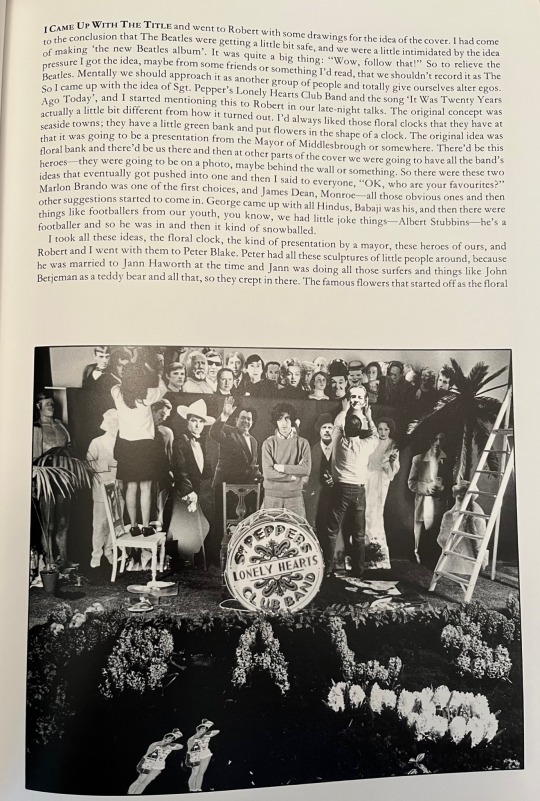


Paul McCartney on Sgt. Pepper. Photos by Michael Cooper
(transcribed below)
I came up with the title and went to Robert with some drawings for the idea of the cover. I had come to the conclusion that The Beatles were getting a little bit safe, and we were a little intimidated by the idea of making 'the new Beatles album.' It was quite a big thing: "Wow, follow that!" So to relieve the pressure I got the idea, maybe from some from friends or something I'd read, that we shouldn't record it as The Beatles.
Mentally we should approach it as another group of people and totally give ourselves alter egos. So I came up with the idea of Sgt. Pepper's Lonely Hearts Club Band and the song 'It was Twenty Years Ago Today', and I started mentioning this to Robert in our late-night talks.
The original concept was actually a little bit different from how it turned out. I'd always liked those floral clocks that they have at seaside towns; they have a little green bank and put flowers in the shape of a clock. The original idea was that it was going to be a presentation from the Mayor of Middlesbrough or somewhere. There'd be this floral bank and there'd be us there and then at other parts of the cover we were going to have all the band's heroes--they were going to be on a photo, maybe behind the wall or something.
So there were these two ideas that eventually got pushed into one and then I said to everyone, 'OK, who are your favourites?" Marlon Brando was one of the first choices, and James Dean, Monroe--all those obvious ones and then other suggestions started to come in. George came up with all the Hindus, Babaji was his, and then there were things like footballers from our youth, you know, we had little joke things--Albert Stubbins--he's a footballer and so he was in and then it kind of snowballed.
I took all these ideas, the floral clock, the kind of presentation by a mayor, these heroes of ours, and Robert and I went with them to Peter Blake. Peter had all these sculptures of little people around, because he was married to Jann Haworth at the time and Jann was doing all those surfers and things like John Betjeman as a teddy bear and all that, so they crept in there.
The famous flowers that started off as the floral clock then became a guitar and the word 'Beatles'--they weren't marijuana leaves, they just looked like them--and so the Americans thought "Wow, well, this is it, it's all happening." We started shooting the cover and people would say, "Oh, can I come, can I come?" and we let more or less everyone come along, but eventually it got to the point where we had to say, "That's enough!"
So Robert would get all this and he'd show all the Indian stuff to George; and there'd be H.G. Wells and Johnny Weissmuller, Issy Bonn and all those people, and Burroughs would have been a suggestion probably from Robert, and there were a few kind of LA guys that Robert had slipped in. He'd slip in people that we didn't even know but we didn't mind, it was the spirit of the thing.
I don't know how many nights Michael spent on it but we were only there for that one night, the last night. They did all this without us. It was very nice when we turned up and it was all done, but not as impressive as when I saw the cover; just actually looking at the set wasn't as impressive as seeing the finished cover.
Jesus and Hitler were on John's favourites list but they had to be taken off. John was that kind of guy but you couldn't very well have Hitler and so he had to go. Gandhi also had to go because the head of EMI, Sir Joe Lockwood, said that in India they wouldn't allow the record to be printed. We said "You're kidding, they'll love it," but he said no, so that was something the lawyers made us take off. There were a few people who just went by the wayside.
We went to Burman's, the theatrical costumiers, to have all our outfits made up and the Stones did the same for the Satanic Majesties album.
It was great. The main centrefold was originally going to be a drawing by The Fool--Simon Posthuma and Marijke Koger, Dutch artists who'd produced some surrealistic work. They depicted us all up in the clouds and it was all very very acid, everything everywhere, lots of colours--but Robert didn't like it as art and so he vetoed it. We said "No man, it's really good. We love it, we love it."
The shoes were made by Anello and David, which was the first place we came into contact with, and we got our lovely handmade Beatle boots there.
Robert and I went down to Peter's house and Peter developed it all from there. The lists were his idea, and all the cut-outs instead of using real people, and then the floral clock got changed around; but basically it was the original theme.
The 'Welcome The Rolling Stones' was something they put in. They sort of asked us if we minded and we said, "No, no, not at all." Peter organized a fairground painter to paint the drum as that was someone that he used to hang out with.
From Blinds & Shutters
32 notes
·
View notes
Text
Nobody cares about Bungou Stray Dogs: 55 Minutes and I will make it everyone’s problem. (Spoilers for the manga, Dead Apple, Dark Era, Fifteen and Strombringer).
I love this light novel. It’s like one of the only ones light novels I actually care about, and you should to if you care about world building on BSD.
But nobody has read it so I have decided to write some fun facts and food for thoughts that the synopsis and summaries can’t make it justice. Also yes, all those works are mentioned or connected to 55 Minutes.
Firstly, I want to point out how Atsushi’s transformation is described:
“He visualize a tiger… the complete opposite of his weak self… Like night cooling the ground, the frailty hidden deep down inside Atsushi grew until it was sinisterly ferocious. The tiger was not of this world. It only existed within him. It was his arrogance and cowardice, his pride and sense of shame. The more he tired to hide his weakness, the more exposed it became… His skin corrugated as his bones started to creak strangely.”
I just love how despite this taken place after the Guild attacked, he still consider himself weak, a coward, and needs someone to help him.
Europe, in average, has more skill users than Japan, and using the war they manufactured a lot of weapons. Nowadays, a lot of those weapons seem to be hidden or in the governments possession.
Victor Hugo, Shakespeare and Johann Wolfgang von Goethe are all canon, they are all Transcendents (just like Rimbaud), they participated on the war, and he fought and caused more casualties at once in the entire history.
H.G. Wells is also a character in the story, she is an ability user that can send the memories of someone 55 minutes to the past and only once, and she also participated on the War and created a weapon of mass destruction. Which is what most people are fighting for in the story.
Apparently Dazai knows how to control his heart beat because of his suicide attempts… know he does it to be a spy.
Andre Gide is also mentioned in the novel and they are partially part of why one of the villains, the Colonel, it’s obsessed with getting a secret weapon. By the end of the light novel, they were trying to piece together Colonel’s story and that it matches, only to find nothing, because the Mimic attack is hidden to the public and cover the event completely, which Dazai of course says so the ADA stops looking for it, since the government just won’t let them. Only for Atsushi to ask “do you know anything about them?” WHICH HURT MY SOUL WHEN I FIRST READ IT.
Dazai famously gets stabbed on this novel, and it’s so noticeable and impressive because he didn’t predicated it at all. The ADA had to make their own plan to rescue his ass. (And this is important to show that they can solve a case without his help).
It’s implied that Dazai is not the only ability user that has a nullified ability.
If an ability user has a to-the-touch ability (Fyodor) or one that doesn’t turn off (Fukuzawa) and they are dead, their ability cannot be used, but abilities can used on them. So if Dazai dies, Yosano can use her ability because he is dead, and like IRL, there’s a time in which people can still be brought back even if they are dead.
The main reason why I wanted to read 55 Minutes was because of Jules Verne and his relationship with Gab (his ability who obtained consciousness).Verne’s ability is Mysterious Island, in which he gains the ability of any user that dies on Standard Island (where the events of the light novel take place). Gab is what happened when someone abuses their own abilities and said ability mutates and grow.
Jules Verne was someone who suffered in the war, his parents died and they did everything to stop the War and suffering of others. He met Wells long after the war was over, and they actually met because they were stopping a terrorist attack on the island Verne swore to protect, not only because it was part of his ability, but because it gave him a purpose.
Jules Verne, after his parents died, joined an organization to stop the war when he was around 12-15 years old. They were named the Seven Traitors. They stopped the war by kidnapping a bunch of world leaders so they signed peace treaties to stop the war… and it worked. Once the war was over, they disappeared essentially and they put Verne in charge of guarding the island. He was fine with it, because those years he spent planning with the Traitor, they all became friends. And with no family, and with the knowledge that his friends were safe, it gave him a purpose.
He is pretty similar to Sigma in that way with DOA. They got attached to a group and were put on a place that gave them a purpose.
The difference is that Verne had the ability to steal the abilities of anyone that died in his island, and that would be his downfall. During Wells and Verne’s plan, she died and he was able to use her ability so she wouldn't die next time, and the problem was to that, in his next try, not everyone was safe, people still got injured. So he continued to go back, and something unexpected happen. The found out that Wells’ and his own ability grew every time he used them. He was able to travel more than 55 minutes to the past. So he started to go back in time over and over again, in part to save Wells and the people he cared about, but it got to the point he tried to go back in time enough that he could stop the War itself. That would be good in theory but the island got free will, and as it grew stronger he overpowered Verne, and eventually took over his body.
I have wanted to read this because this could happen to Atsushi at any time, if their abilities get free will. Which sadly they are. Verne's ability was Standard Island, but he got a name Gab. Atsushi's ability name is Beast Underneath The Moonlight. And we see this struggle with Verlaine and Chuuya on Fifteen and specially Stormbringer. They struggle to keep their sense of humanity, and the separation of them as people and as abilities.
Alongside this, I want you to remember the war was 13 years ago, Jules, Gab and Verne and the entire island have being on a time-loops for over a decade.
Something important I want to point out: Atsushi didn't fight Gab, it was only Byakko (the white tiger). During the whole battle, Atsushi just let Byakko took over, and defeated him. And most importantly Gab is talking to it. He said:
“I’ve been conscious ever since my master, Verne, controlled this body- but I couldn’t say anything. My voice reached no one. I was neither alive nor dead. I was just alone in lukewarm darkness, wondering who I was.”
(Which sounds kinda familiar if you have read Stormbringer)
There’s also an interesting parallel to the themes of DEAD APPLE: the connections of souls, abilities and the reason to live. “Gifts are lodged deep inside the human soul. You shouldn’t remove them” Which is interesting and notorious since Shibusawa and Verne NEED to kill the users to obtain their abilities.
ALSO, IMPORTANT: Even if Gab is on control, Verne is still conscious inside of the body. He just can’t reach anyone at all. Except, curiously, Atsushi. I wonder why (I have theories, but nothing is confirmed)?
Also @yarrayora here’s your “Bungou Stray Gods can be canon” evidence:
“I think a lot of skill users believe their skill is part of them” Atsushi said as if answering his own question “But maybe they’re wrong. Maybe they come from somewhere else and stick to us. Maybe they’re something we can’t understand… I don’t really know how to put it into words, but that’s how I feel.”
Atsushi, at the end of the events, thinks back to Verne and Gab, wonders if Verne and the Seven Traitors acted like the ADA, and maybe that’s why Gab joined the same group of people while stuck on the time loops, so maybe he could experience what Verne felt with the Traitors; and if Gab ever had true friends that he could have ended differently.
#bungou stray dogs#dead apple#FIFTEEN#bsd fifteen#bsd dead apple#storm bringer#bsd storm bringer#bsd 55 minutes#55 minutes#bsd dark era#bsd verlaine#bsd verne#bsd wells#bsd gide#bsd rimbaud#bsd gab
283 notes
·
View notes
Text
PrUK / FrUK Historical Fluff [PART 9] [FINAL]
As a gift from France, England receives a pair of tickets to a spectacular exhibition in Paris. He decides to bring Canada along to the event and they explore the wonderous inventions amidst the backdrop of the Industrial Revolution.
Click Here to Read from the Beginning
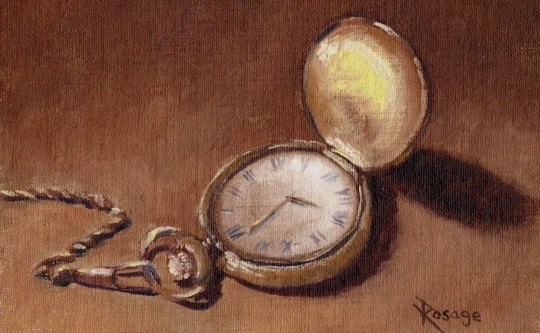
Industry and Grandeur - Chapter 9
Somewhere, Someplace; Modern Times
As the great H.G. Wells once put it, “We must not allow the clock and the calendar to blind us to the fact that each moment of life is a miracle and mystery.”
In an old home, there is a letter that lies tucked within books and long-forgotten records. The papers are yellowed and flimsy, worn from decades of dust and more than a century of fingerprint oils. On the pages lies a careful cursive script in ink. It reads thus:
Dearest Canada,
There is a certain subject matter that I have long set aside and avoided discussing with you. Indeed, there was a period where I assumed this need not be said at all, but today’s experiences have shown me that is not the case. Of course, I am aware that this is a difficult topic. However – and I understand if perhaps the following is not said quite enough – I do care about you very much. Therefore, I believe we would do well to maintain our harmonious relationship as we strive to navigate the future smoothly.
Truthfully, a harmonious relationship is not one that comes easily; not for our kind, and as I am sure you have grown to realise, not for myself either. For many centuries, I was stuck in a figurative swamp, closed off by a thick and endless fog of discontent. Then at last, I arrived on the shores of the New World, not expecting to find anything more than forests and precious metals, and yet I found you.
Both you and your brother brought me unimaginable happiness, in ways I thought were lost to the annals of time. You, Canada, have continued this blessing, and from all that you do and say, I believe you are virtuous, steadfast, and loyal. In recent years, however, a change has been occurring, and I feel there is a new chasm opening between us. Because of our growing distance, there are days when I find myself dreaming of the past: watching you undertake a new English novel, baking pork meat pies until sunset, and having you fall asleep in my arms by the roaring fire.
But I am no fool. You are maturing and changing; although, I believe it is precisely that which startles me. Change is something I would well prefer to do without, and to hold still the ticking hands of time or stop up the draining hourglass. This is, as I recognise, an impossible wish. In my own life, I have seen grasslands that became villages that became towns, and the travelling vagabonds who settled there, brought their cultures, trinkets, and coins which bore the faces of foreign rulers, further changing the landscape beyond recognition. With the might of human knowledge, each new century smashes expectations of the last and time is always relentlessly marching forward, regardless of how I or anyone feels about it.
And of course, this can oftentimes be painful. It can be bitter and sorrowful. However, there are also cases when change is unexpectedly welcome, when it brings great delight.
With that in mind, I would very much like to see you continue to grow. When you next seek out a companion, please do so without fear of my interference. Allow yourself to misstep, within reason, and learn from those experiences, especially those ordeals which cause agony. For there are occasions when that agony is good, and signals that a murky fog has begun to dissipate. Those are the hurts which are most important.
And lastly, if it is not too much trouble, for the sake of my sanity, please kindly try to return on time.
I remain,
Your devoted guardian
England
This 1st day of May, 1844.
Every few decades, the letter is found, read, and returned to the pile of memories. The hurts it details do not cause heartbreak any longer, because humanity does not die at the end of each day. It moves forward, in as much a way that it should hope to honour the grand future.
End / Fin
~~~
Author’s Notes
This is the first multi-chapter story that I have ever completed. I hope you enjoyed reading it.
Truthfully, I feel like I could keep going on with this story forever. But I have many other ideas that I’d like to explore, so I felt it was time to put this one down. After all, I’ve been working on this since May of 2021! Wow, that feels like so long ago.
If you’re interested, I have more Hetalia fanfics that you can read right HERE!
Before you go, thank you very much for reading until the end! It means the world to me. ❤
< Previous Chapter
#aph england#aph canada#historical hetalia#Hetalia Fanfiction#my writing#hws england#hws canada#arthur kirkland#matthew williams#hetalia#fruk#pruk#hws prussia#hws france#aph prussia#aph france#francis bonnefoy#gilbert beilschmidt
19 notes
·
View notes
Text
The Time Machine by H.G. Wells
Introduction and Chapter 2
Introduction
The Time Traveller (for so it will be convenient to speak of him) was
expounding a recondite matter to us. His pale grey eyes shone and
twinkled, and his usually pale face was flushed and animated. The fire
burnt brightly, and the soft radiance of the incandescent lights in the
lilies of silver caught the bubbles that flashed and passed in our
glasses. Our chairs, being his patents, embraced and caressed us rather than submitted to be sat upon, and there was that luxurious
after-dinner atmosphere, when thought runs gracefully free of the
trammels of precision. And he put it to us in this way—marking the
points with a lean forefinger—as we sat and lazily admired his
earnestness over this new paradox (as we thought it) and his fecundity.
“You must follow me carefully. I shall have to controvert one or two
ideas that are almost universally accepted. The geometry, for instance, they taught you at school is founded on a misconception.”
“Is not that rather a large thing to expect us to begin upon?” said
Filby, an argumentative person with red hair.
“I do not mean to ask you to accept anything without reasonable ground for it. You will soon admit as much as I need from you. You know of course that a mathematical line, a line of thickness nil, has no real existence. They taught you that? Neither has a mathematical plane. These things are mere abstractions.”
“That is all right,” said the Psychologist.
“Nor, having only length, breadth, and thickness, can a cube have a
real existence.”
“There I object,” said Filby. “Of course a solid body may exist. All
real things—”
“So most people think. But wait a moment. Can an instantaneous cube exist?”
“Don’t follow you,” said Filby.
“Can a cube that does not last for any time at all, have a real
existence?”
Filby became pensive. “Clearly,” the Time Traveller proceeded, “any
real body must have extension in four directions: it must have
Length, Breadth, Thickness, and—Duration. But through a natural
infirmity of the flesh, which I will explain to you in a moment, we
incline to overlook this fact. There are really four dimensions, three
which we call the three planes of Space, and a fourth, Time. There is,
however, a tendency to draw an unreal distinction between the former three dimensions and the latter, because it happens that our
consciousness moves intermittently in one direction along the latter
from the beginning to the end of our lives.”
“That,” said a very young man, making spasmodic efforts to relight his cigar over the lamp; “that . . . very clear indeed.”
“Now, it is very remarkable that this is so extensively overlooked,”
continued the Time Traveller, with a slight accession of cheerfulness.
“Really this is what is meant by the Fourth Dimension, though some
people who talk about the Fourth Dimension do not know they mean it. It is only another way of looking at Time. There is no difference between Time and any of the three dimensions of Space except that our consciousness moves along it. But some foolish people have got hold of the wrong side of that idea. You have all heard what they have to say about this Fourth Dimension?”
“I have not,” said the Provincial Mayor.
“It is simply this. That Space, as our mathematicians have it, is
spoken of as having three dimensions, which one may call Length,
Breadth, and Thickness, and is always definable by reference to three
planes, each at right angles to the others. But some philosophical
people have been asking why three dimensions particularly—why not
another direction at right angles to the other three?—and have even
tried to construct a Four-Dimensional geometry. Professor Simon Newcomb was expounding this to the New York Mathematical Society only a month or so ago. You know how on a flat surface, which has only two dimensions, we can represent a figure of a three-dimensional solid, and similarly they think that by models of three dimensions they could represent one of four—if they could master the perspective of the thing. See?”
“I think so,” murmured the Provincial Mayor; and, knitting his brows,
he lapsed into an introspective state, his lips moving as one who
repeats mystic words. “Yes, I think I see it now,” he said after some
time, brightening in a quite transitory manner.
“Well, I do not mind telling you I have been at work upon this geometry of Four Dimensions for some time. Some of my results are curious. For instance, here is a portrait of a man at eight years old, another at fifteen, another at seventeen, another at twenty-three, and so on. All these are evidently sections, as it were, Three-Dimensional representations of his Four-Dimensioned being, which is a fixed and unalterable thing.
“Scientific people,” proceeded the Time Traveller, after the pause
required for the proper assimilation of this, “know very well that Time
is only a kind of Space. Here is a popular scientific diagram, a
weather record. This line I trace with my finger shows the movement of the barometer. Yesterday it was so high, yesterday night it fell, then
this morning it rose again, and so gently upward to here. Surely the
mercury did not trace this line in any of the dimensions of Space
generally recognised? But certainly it traced such a line, and that
line, therefore, we must conclude, was along the Time-Dimension.”
“But,” said the Medical Man, staring hard at a coal in the fire, “if
Time is really only a fourth dimension of Space, why is it, and why has it always been, regarded as something different? And why cannot we move in Time as we move about in the other dimensions of Space?”
The Time Traveller smiled. “Are you so sure we can move freely in
Space? Right and left we can go, backward and forward freely enough, and men always have done so. I admit we move freely in two dimensions. But how about up and down? Gravitation limits us there.”
“Not exactly,” said the Medical Man. “There are balloons.”
“But before the balloons, save for spasmodic jumping and the
inequalities of the surface, man had no freedom of vertical movement.”
“Still they could move a little up and down,” said the Medical Man.
“Easier, far easier down than up.”
“And you cannot move at all in Time, you cannot get away from the
present moment.”
“My dear sir, that is just where you are wrong. That is just where the
whole world has gone wrong. We are always getting away from the present moment. Our mental existences, which are immaterial and have no dimensions, are passing along the Time-Dimension with a uniform velocity from the cradle to the grave. Just as we should travel down if we began our existence fifty miles above the earth’s surface.”
“But the great difficulty is this,” interrupted the Psychologist. ’You
can move about in all directions of Space, but you cannot move about in Time.”
“That is the germ of my great discovery. But you are wrong to say that we cannot move about in Time. For instance, if I am recalling an
incident very vividly I go back to the instant of its occurrence: I
become absent-minded, as you say. I jump back for a moment. Of course we have no means of staying back for any length of Time, any more than a savage or an animal has of staying six feet above the ground. But a civilised man is better off than the savage in this respect. He can go up against gravitation in a balloon, and why should he not hope that ultimately he may be able to stop or accelerate his drift along the Time-Dimension, or even turn about and travel the other way?”
“Oh, this,” began Filby, “is all—”
“Why not?” said the Time Traveller.
“It’s against reason,” said Filby.
“What reason?” said the Time Traveller.
“You can show black is white by argument,” said Filby, “but you will
never convince me.”
“Possibly not,” said the Time Traveller. “But now you begin to see the
object of my investigations into the geometry of Four Dimensions. Long ago I had a vague inkling of a machine��”
“To travel through Time!” exclaimed the Very Young Man.
“That shall travel indifferently in any direction of Space and Time, as
the driver determines.”
Filby contented himself with laughter.
“But I have experimental verification,” said the Time Traveller.
“It would be remarkably convenient for the historian,” the Psychologist suggested. “One might travel back and verify the accepted account of the Battle of Hastings, for instance!”
“Don’t you think you would attract attention?” said the Medical Man.
“Our ancestors had no great tolerance for anachronisms.”
“One might get one’s Greek from the very lips of Homer and Plato,” the Very Young Man thought.
“In which case they would certainly plough you for the Little-go. The
German scholars have improved Greek so much.”
“Then there is the future,” said the Very Young Man. “Just think! One
might invest all one’s money, leave it to accumulate at interest, and
hurry on ahead!”
“To discover a society,” said I, “erected on a strictly communistic
basis.”
“Of all the wild extravagant theories!” began the Psychologist.
“Yes, so it seemed to me, and so I never talked of it until—”
“Experimental verification!” cried I. “You are going to verify that?”
“The experiment!” cried Filby, who was getting brain-weary.
“Let’s see your experiment anyhow,” said the Psychologist, “though it’s all humbug, you know.”
The Time Traveller smiled round at us. Then, still smiling faintly, and
with his hands deep in his trousers pockets, he walked slowly out of
the room, and we heard his slippers shuffling down the long passage to his laboratory.
The Psychologist looked at us. “I wonder what he’s got?”
“Some sleight-of-hand trick or other,” said the Medical Man, and Filby tried to tell us about a conjuror he had seen at Burslem, but before he had finished his preface the Time Traveller came back, and Filby’s anecdote collapsed.
II.
The Machine
The thing the Time Traveller held in his hand was a glittering metallic
framework, scarcely larger than a small clock, and very delicately
made. There was ivory in it, and some transparent crystalline
substance. And now I must be explicit, for this that follows—unless his explanation is to be accepted—is an absolutely unaccountable thing. He took one of the small octagonal tables that were scattered about the room, and set it in front of the fire, with two legs on the hearthrug. On this table he placed the mechanism. Then he drew up a chair, and sat down. The only other object on the table was a small shaded lamp, the bright light of which fell upon the model. There were also perhaps a dozen candles about, two in brass candlesticks upon the mantel and several in sconces, so that the room was brilliantly illuminated. I sat in a low arm-chair nearest the fire, and I drew this forward so as to be almost between the Time Traveller and the fireplace. Filby sat behind him, looking over his shoulder. The Medical Man and the Provincial Mayor watched him in profile from the right, the Psychologist from the left. The Very Young Man stood behind the Psychologist. We were all on the alert. It appears incredible to me that any kind of trick, however subtly conceived and however adroitly done, could have been played upon us under these conditions.
The Time Traveller looked at us, and then at the mechanism. “Well?”
said the Psychologist.
“This little affair,” said the Time Traveller, resting his elbows upon
the table and pressing his hands together above the apparatus, “is only a model. It is my plan for a machine to travel through time. You will notice that it looks singularly askew, and that there is an odd
twinkling appearance about this bar, as though it was in some way
unreal.” He pointed to the part with his finger. “Also, here is one
little white lever, and here is another.”
The Medical Man got up out of his chair and peered into the thing.
“It’s beautifully made,” he said.
“It took two years to make,” retorted the Time Traveller. Then, when we had all imitated the action of the Medical Man, he said: “Now I want you clearly to understand that this lever, being pressed over, sends the machine gliding into the future, and this other reverses the
motion. This saddle represents the seat of a time traveller. Presently
I am going to press the lever, and off the machine will go. It will
vanish, pass into future Time, and disappear. Have a good look at the
thing. Look at the table too, and satisfy yourselves there is no
trickery. I don’t want to waste this model, and then be told I’m a
quack.”
There was a minute’s pause perhaps. The Psychologist seemed about to speak to me, but changed his mind. Then the Time Traveller put forth his finger towards the lever. “No,” he said suddenly. “Lend me your hand.” And turning to the Psychologist, he took that individual’s hand in his own and told him to put out his forefinger. So that it was the Psychologist himself who sent forth the model Time Machine on its interminable voyage. We all saw the lever turn. I am absolutely certain there was no trickery. There was a breath of wind, and the lamp flame jumped. One of the candles on the mantel was blown out, and the little machine suddenly swung round, became indistinct, was seen as a ghost for a second perhaps, as an eddy of faintly glittering brass and ivory; and it was gone—vanished! Save for the lamp the table was bare.
Everyone was silent for a minute. Then Filby said he was damned.
The Psychologist recovered from his stupor, and suddenly looked under the table. At that the Time Traveller laughed cheerfully. “Well?” he said, with a reminiscence of the Psychologist. Then, getting up, he
went to the tobacco jar on the mantel, and with his back to us began to fill his pipe.
We stared at each other. “Look here,” said the Medical Man, “are you in earnest about this? Do you seriously believe that that machine has
travelled into time?”
“Certainly,” said the Time Traveller, stooping to light a spill at the
fire. Then he turned, lighting his pipe, to look at the Psychologist’s
face. (The Psychologist, to show that he was not unhinged, helped
himself to a cigar and tried to light it uncut.) “What is more, I have
a big machine nearly finished in there”—he indicated the
laboratory—“and when that is put together I mean to have a journey on my own account.”
“You mean to say that that machine has travelled into the future?” said Filby.
“Into the future or the past—I don’t, for certain, know which.”
After an interval the Psychologist had an inspiration. “It must have
gone into the past if it has gone anywhere,” he said.
“Why?” said the Time Traveller.
“Because I presume that it has not moved in space, and if it travelled
into the future it would still be here all this time, since it must
have travelled through this time.”
“But,” said I, “If it travelled into the past it would have been
visible when we came first into this room; and last Thursday when we
were here; and the Thursday before that; and so forth!”
“Serious objections,” remarked the Provincial Mayor, with an air of
impartiality, turning towards the Time Traveller.
“Not a bit,” said the Time Traveller, and, to the Psychologist: “You
think. You can explain that. It’s presentation below the threshold,
you know, diluted presentation.”
“Of course,” said the Psychologist, and reassured us. “That’s a simple
point of psychology. I should have thought of it. It’s plain enough,
and helps the paradox delightfully. We cannot see it, nor can we
appreciate this machine, any more than we can the spoke of a wheel
spinning, or a bullet flying through the air. If it is travelling
through time fifty times or a hundred times faster than we are, if it
gets through a minute while we get through a second, the impression it creates will of course be only one-fiftieth or one-hundredth of what it would make if it were not travelling in time. That’s plain enough.” He passed his hand through the space in which the machine had been. “You see?” he said, laughing.
We sat and stared at the vacant table for a minute or so. Then the Time Traveller asked us what we thought of it all.
“It sounds plausible enough tonight,” said the Medical Man; “but wait
until tomorrow. Wait for the common sense of the morning.”
“Would you like to see the Time Machine itself?” asked the Time
Traveller. And therewith, taking the lamp in his hand, he led the way
down the long, draughty corridor to his laboratory. I remember vividly
the flickering light, his queer, broad head in silhouette, the dance of
the shadows, how we all followed him, puzzled but incredulous, and how there in the laboratory we beheld a larger edition of the little
mechanism which we had seen vanish from before our eyes. Parts were of nickel, parts of ivory, parts had certainly been filed or sawn out of rock crystal. The thing was generally complete, but the twisted
crystalline bars lay unfinished upon the bench beside some sheets of
drawings, and I took one up for a better look at it. Quartz it seemed
to be.
“Look here,” said the Medical Man, “are you perfectly serious? Or is
this a trick—like that ghost you showed us last Christmas?”
“Upon that machine,” said the Time Traveller, holding the lamp aloft,
“I intend to explore time. Is that plain? I was never more serious in
my life.”
None of us quite knew how to take it.
I caught Filby’s eye over the shoulder of the Medical Man, and he
winked at me solemnly.
#hellsitesonlybookclub#the time machine#H.G. Wells#hg wells#time machine#sci fi#science fiction#book club#daily book club#public domain book club#public domain#time travel
7 notes
·
View notes
Text
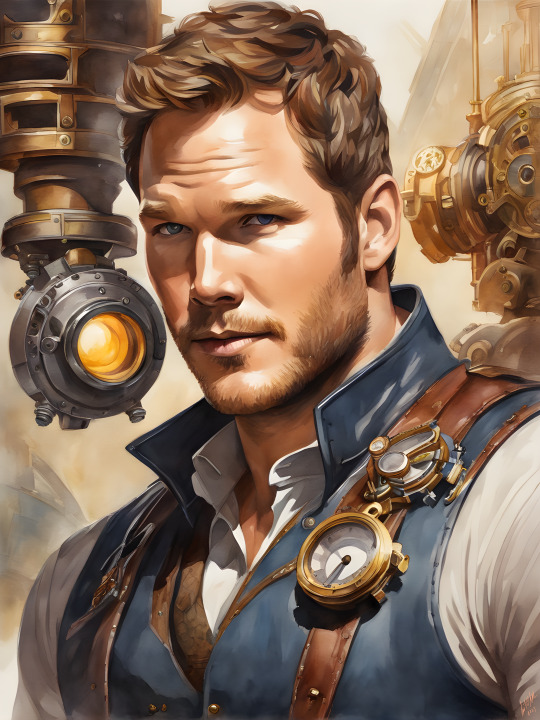
How about Chris Pratt starring in a thrilling steampunk action adventure, set in a world reminiscent of the imaginative stories crafted by Jules Verne, H.G. Wells, Sir Arthur Conan Doyle, Robert Louis Stevenson, or C.S. Lewis?
Instead of relying on an established character, it would be refreshing to introduce a brand new protagonist who captures the essence of this genre.
While I have always enjoyed H. Rider Haggard's Allan Quatermain character, it is unfortunate that Hollywood has produced several disappointing adaptations of his stories. However, this presents an opportunity to create a fresh and captivating narrative that pays homage to the spirit of Haggard's work.
On a lighter note, the portrayal of Allan Quatermain in the movie "League of Extraordinary Gentlemen" with Sean Connery is a subject of debate. Some argue that it was either exceptionally bad or so bad that it became oddly enjoyable. It's a lighthearted observation to ponder.
2 notes
·
View notes
Text
This Summer, I Became the Book-Banning Monster of Iowa

by Bridgette Exman
A couple of weeks ago, before the start of another school year, I found myself standing in the middle of the stacks in our high school library, my heart sinking. I had come in search of five books that I needed to read to make the final determination about whether they would remain on the shelves for our students or be boxed up and stored in my office, not to be seen by the students under penalty of law.
The one book that especially pained me was “Friday Night Lights” by H.G. Bissinger.
When I pulled the sole copy from its tidy place among the B’s to reread, I noticed its tattered, torn and taped cover. It has been well loved by our student body. It gives me no joy to limit the books available to them, and I am grateful that in the end I was able to keep “Friday Night Lights” on the shelf. That well-worn copy will be replaced by two new ones; I plan to keep the original in my office as a reminder of the summer I became the book-banning monster generating headlines the world over.
Iowa’s “parental rights bill,” signed into law at the end of May and made effective July 1, put public schoolteachers and administrators in an untenable position and recently thrust my own district in north-central Iowa into notoriety.
The law mandates that school libraries may only contain “age-appropriate” books free of any “descriptions or visual depictions of a sex act” as defined by Iowa Code. In a particularly draconian move, the law holds individual teachers and school librarians accountable for violations.
READ MORE
4 notes
·
View notes
Note
is there a strictly auditive piece of media that has inspired you in some way ?
Audio only media, hmm?
I'll tackle this as a hypnosis question and a general question individually because I'm not 100% sure how to parse it.
For hypnosis Ella Enchanting is my big inspiration. Goddess' stuff is way too high production to even enter my mind as a possible avenue and it blows my mind that I sleep in the same area as some of the files that I listen to nightly were recorded. It kind of makes me feel I should be better at this because every single thing that the most highly produced files I know of (and the podcast episodes that she ran too) are theoretically in the same space as me.
I dunno. Maybe one day I will ask her how the hell she did what she did.
For Ella she has about the same production as I do and is focused on the same area of concept based fantasies. She's way more energetic, inventive, practiced and polished than I am, but I see Ella and have a feeling of boldness that says I can do better if I commit myself.
I really need to more often.
Also back to Goddess for a moment, but The Realm of Bliss Podcast was one of my earliest gateways into legitimizing my kink. Up until then it felt like a sex thing people in relationships did or a medical tool that was done with clients or a theatrical performance piece for stage magicians. There weren't many episodes, but Realm of Bliss really brought me in to the fold. It's why I call Goddess my oldest friend in the community-- ignoring the collar and such.
For Other Media...
I used to be big into podcasts, particularly Maximum Fun network. There were so many MBMBAM jokes in my circle and I felt Adventure Zone helped me be a better DM. I listened to some stuff like Tanis and Rabbits but Rabbits burned me real hard and kind of poisoned the well for me.
Never got in to Night Vale but tried really hard for a friend who enjoyed it. I wanted to have common language with them. Listened to well over 20 episodes. They would have benefited me trying Magnus Archives but I didn't have the drive for it.
To give respect where respect is due, radio plays in general make me very happy and have since I fell in love with the Welles version of H.G Wells classic War of the Worlds in my teens. If Radio 4 did a dramatization of any of Gaiman or Pratchett's work I was there eagerly. I consider radio adaptation of Neverwhere to be the definitive telling of the story (and the Marquis focused original side story too) and deeply enjoyed Mort when it was done. Good Omens was nice but the TV version is best.
When I was young I listened to radio a lot and focused in on those radio dramas. It was either that or listen to Caeser the Geezer prank people, which dad liked but... not my cup of tea.
So when I was heavy in to tabletop I used to do a LOT of audio files as rewards and cookies for players. One character I had hours of audio and hundreds of thousands of words of backstory because they played an amnesiac and I wanted to make their life feel lived in and make the people feel more real before they showed up in canon.
Then I just became addicted to it and did it for fun. The group's DM was always better than me at it. Every time I got audio from them it felt like a fully realized piece where mine was conceptual at best.
I guess auditive media is something of a focus of mine, even if I can't really define my preferences or the things I gravitate towards.
Thank you for. The question, anon. This was a good one that got me thinking about things that haven't crossed my mind in years.
4 notes
·
View notes
Note
1, 2, and 12! (:
<3
1. What’s the first audio drama you ever listened to?
I'm guessing it was probably Girl in Space. I didn't know anything from the sphere back at the beginning, and I wasn't really interested in Night Vale, so GiS was the first big show I ran across.
2. What’s a song you associate really strongly with a specific show?
I'd probably say “Please Listen Carefully” by Jahzzar, used as the end theme for Interference, a favourite show of mine. Once I heard it used in another piece of audio drama somewhere, and it threw me for such a loop I had to stop listening. :D
12. If you could adapt any public domain work into an audio drama what would it be?
I don't know if it'd be top of my list - there's a lot of really weird fun stuff out there - and it might be a little on the nose, but I'd take a crack at H.G. Wells' The First Men In The Moon. Or maybe The Picture of Dorian Gray. Or wait! I was just searching, and apparently the original version of House on Haunted Hill is in the public domain???? Or the first Hardy Boys books just became public domain this year, I could do fun things with those ...
2 notes
·
View notes
Text
HERMES
“I sing of Cyllenian Hermes, the Slayer of Argus, lord of Cyllene and Arcadia rich in flocks, luck-bringing messenger of the deathless gods. He was born of Maia, the daughter of Atlas, when she had made with Zeus, -- a shy goddess she…. And so hail to you, Son of Zeus and Maia; with you I have begun: now I will turn to another song! Hail, Hermes, giver of grace, guide, and giver of good things! (-Homeric Hymn, translated by H.G. Evelyn white)
HERMES (HUR-meez), is the trickster herald and messenger of the gods, as well as god of diplomacy, commerce, travelers, and trade. He is one of the few deities with the power to move between the earthly and underworld realms. Initially he was portrayed as middle aged with dark beard and long locks, but later he was portrayed as a beardless youth. He created the first musical instruments, the lyre and flute, and, interestingly, was the father of goat legged Pan.
Hermes is a psychopomp; (a leader of spirits into the Underworld.) He also appears as an ally to mortals in a number in myths:. Hermes assists Perseus by providing an adamantine sickle sword to behead Medusa, and in the Odyssey, Hermes assists Odysseus by providing a magic herb to protect the hero against the witchcraft of Circe.
Hermes mother is Maia, one of the PleiadesPleaides, who eventually became constellations. With this ancestry, Hermes has associations with both Astronomy (sky constellations) and astrology (zodiac signs surrounding his herald’s wand). He was also the god of sleep, and could put mortals to sleep or wake them up with his wand. Being the god of travelers and herds, at the bottom we can see stone markers called Herma, and a herd of sheep.
Want to own my Illustrated Greek myth book jam packed with over 130 illustrations like this? Support my book kickstarter "Lockett Illustrated: Greek Gods and Heroes" coming in early 2024. check my bio LINKTREE
#pagan#hellenism#greek mythology#tagamemnon#mythology tag#percyjackson#dark academia#greek#greekmyths#classical literature#percy jackon and the olympians#pjo#homer#iliad#classics#mythologyart#art#artists on tumblr#odyssey#literature#ancientworld#ancienthistory#ancient civilizations#ancientgreece#olympians#greekgods#agamemnon#troy#trojanwar
27 notes
·
View notes
Text
night followed day like the flapping of a black wing. ... The slowest snail that ever crawled dashed by too fast for me. The twinkling succession of darkness and light was excessively painful to the eye. Then, in the intermittent darknesses, I saw the moon spinning swiftly through her quarters from new to full, and had a faint glimpse of the circling stars. Presently, as I went on, still gaining velocity, the palpitation of night and day merged into one continuous greyness; the sky took on a wonderful deepness of blue, a splendid luminous colour like that of early twilight; the jerking sun became a streak of fire, a brilliant arch, in space; the moon a fainter fluctuating band; and I could see nothing of the stars, save now and then a brighter circle flickering in the blue.
The landscape was misty and vague. I was still on the hillside upon which this house now stands, and the shoulder rose above me grey and dim. I saw trees growing and changing like puffs of vapour, now brown, now green; they grew, spread, shivered, and passed away. I saw huge buildings rise up faint and fair, and pass like dreams. The whole surface of the earth seemed changed—melting and flowing under my eyes.
- H.G. Wells, The Time Machine
5 notes
·
View notes
Text
LUCY & THE SPACE RACE
April 12th - International Space Day
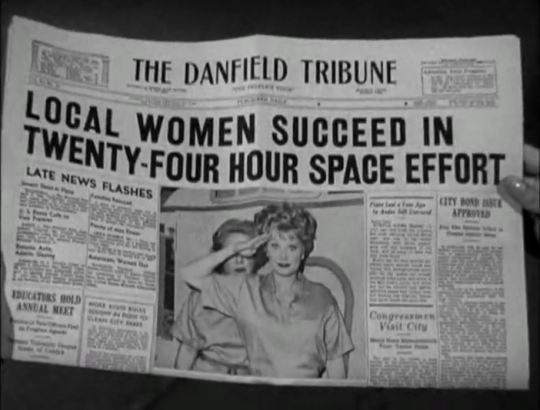
International Day for Human Space Flight takes place across the world on April 12. The day celebrates the first space flight and the first human being in space — Soviet cosmonaut, Yuri Gagarin - on April 12, 1961. Naturally, the space age ramped up on TV as well.
Long before man actually went to space, people wondered what might be up there.

In the 1950′s, America was fascinated by the idea of aliens - mainly Martians. Books, films, and television shows all captalized on this fear of the unknown.
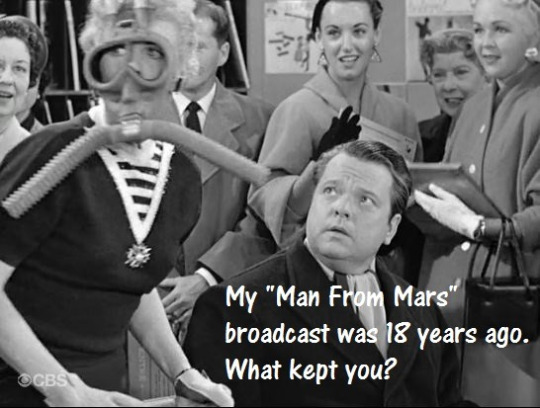
The fascination and fear of outer space can be traced back to “War of The Worlds”, an 1898 novel by H.G. Wells. In 1938, Orson Welles and the Mercury Radio Theatre used it as a basis for a broadcast that many believed to be an actual invansion from outer space.
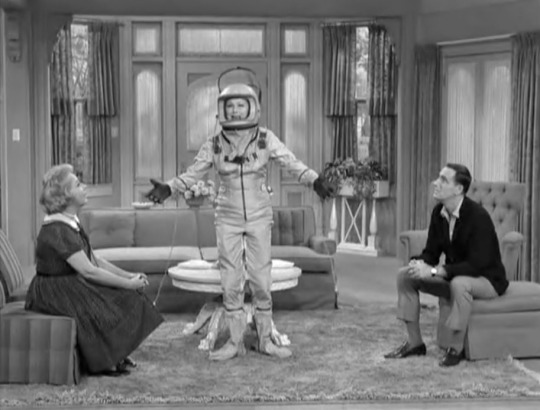
In “Lucy Becomes an Astronaut” (November 5, 1962) Lucy Carmichael and Vivian Bagley successfully spend 24 hours in a simulated space ship as part of a 'Women in Space’ experiment.

Lucy just calls it “the space program,” but her daughter Chris knows that it is actually called NASA – the National Aeronautics and Space Administration. President Eisenhower established NASA in 1958. Alan Shepard became the first American in space in May 1961, just three weeks after Russian Yuri Gargarin. Although the American team planned to launch earlier, delays continually pushed the launch back, allowing the Russian program to scoop the headlines.
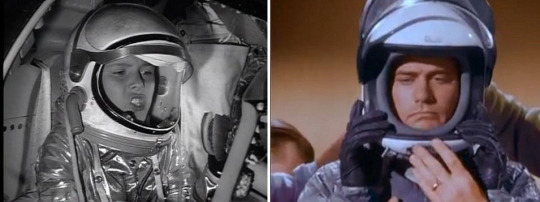
“The Lucy Show” wasn’t the only TV show to use the space program as the basis for storylines. Three months later “Dennis the Menace” aired “Junior Astronaut,” where Dennis and his classmates participate in the 'Junior Astronaut’ savings-stamp program. This episode starred Gale Godon, who would join “The Lucy Show” cast in season two. Star Jay North did a short promotional film for the real-life savings-stamp program to support NASA.

Also in January 1963, “McKeever & the Colonel,” a one-season sitcom that premiered on NBC a week before “The Lucy Show”, explored the topic in “McKeever’s Astronaut,” where a visiting astronaut turns out to be a chimp. Although not in the cast of this particular episode, Charles Lane (Lucy Carmichael’s banker Mr. Barnsdahl) was featured on the series in November 1962. Shirley Mitchell (Lucy Ricardo’s friend Marion Strong) was in the series premiere.

The most famous example of the space program on television is the sitcom “I Dream of Jeannie,” which premiered in 1965. It not only featured astronauts as the central characters, it was set in Cape Canaveral, Florida. After John F. Kennedy’s assassination in 1963, the name was changed to Cape Kennedy. It reverted to Cape Canaveral a decade later, although the NASA facilities are still known as the Kennedy Space Center. Jeannie was played by Barbara Eden, who made her sitcom debut on a 1957 episode of “I Love Lucy.”

Lucy revisited the subject on October 11, 1971 on the “Here’s Lucy” episode “Lucy and the Astronauts”. When Harry and Lucy attend a splash down, she rushes to hug the returning crew before they can be medically cleared, meaning she and Harry must be quarantined with the astronauts.
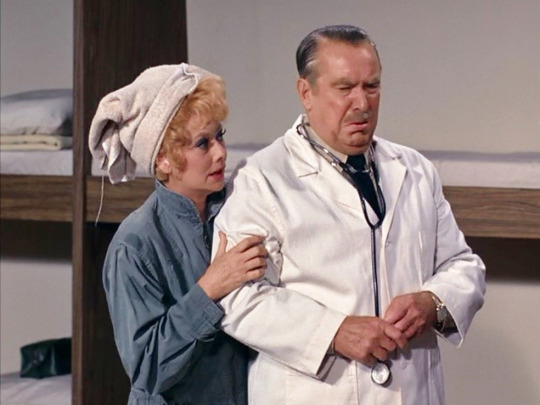
Barely tolerating Lucy in the isolation unit, Dr. Jamison (Roy Roberts) grumbles “We never had this trouble with Neil Armstrong.” Neil Armstrong was the first American astronaut to set foot on the moon on July 21, 1969. Armstrong traveled with Buzz Aldrin on Apollo 11. His famous quote when he stepped onto the moon’s surface was “That’s one small step for man, one giant leap for mankind.”

The episode incorporates stock footage of televised moon walks and splash downs.

This episode was featured in a set of View-Master reels. The View-Master system was introduced in 1939 by GAF, four years after the advent of Kodachrome color film.
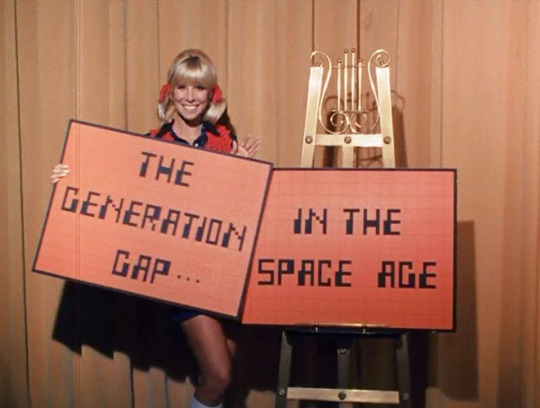
The third act of “Lucy and the Generation Gap” (1969) was set in a futuristic space age in a musical comedy context.
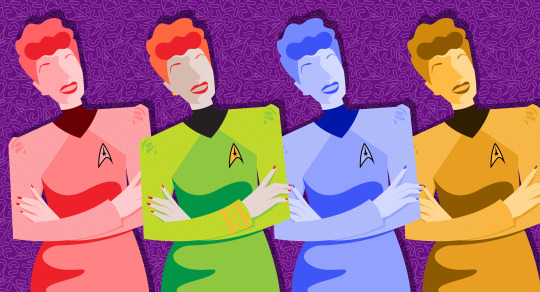
In 1966, Desilu produced a science fiction series that explored life in outer space - “Star Trek”. Each episode started with the iconic phrase:
“Space: The Final Frontier”
Ball was friends with Majel Barrett and thought Gene Rodenberry was a talented creator. She supported the show when the network rejected it. Thanks to Lucy, the now iconic franchise has immeasurably contributed to the popularity of the space program.
#Lucille Ball#Space#Outer Space#NASA#TV#I Love Lucy#The Lucy Show#Here's Lucy#Star Trek#April 12#Astronaut
5 notes
·
View notes
Text




Pics:
1 & 2. Photos of Jules Verne, himself.
3 & 4. Covers to various editions of the story under investigation. #3 includes Mysterious Island as well. And #4 has a great painting of the battling sea leviathans!
1906: The Earth (is) Not Hollow.
In 1864, polymath, dreamer & sci-fi writer Jules Verne published his huge hit "Journey to the Center of the Earth."
Plot: This journey starts with a German geologist examining a runic manuscript with a backwards coded Latin inscription.
An alchemist secreted instructions to reach the center of the world! And the way in is thru Mt. Snaefell, a dormant volcano...
Once finding the entrance, our heroes get lost in the roots of the mountain. Following an underground river, they reach a vast shoreline. Which is all covered in giant mushrooms - growing from mastodon bones!
They make a raft out of petrified wood & sail for the far shore...
They barely survive a battle between giant sea dinosaurs & a long lasting electrical storm.
Reaching the shore, they explore the beach, finding a human skull &, a fossilized human body!
Suddenly, they see a giant - who's busy shepherding a herd of living mastodons!!
Fleeing, they follow a marked path to a blocked way. This they blow aside with gunpowder.
Back on their craft, they're carried away in a torrent. Hours later, they're suddenly pushed upwards...
Two months after they entered this underworld, they're disgorged - via a volcanic eruption (!!) - on the surface of Stromboli Island, Italy!
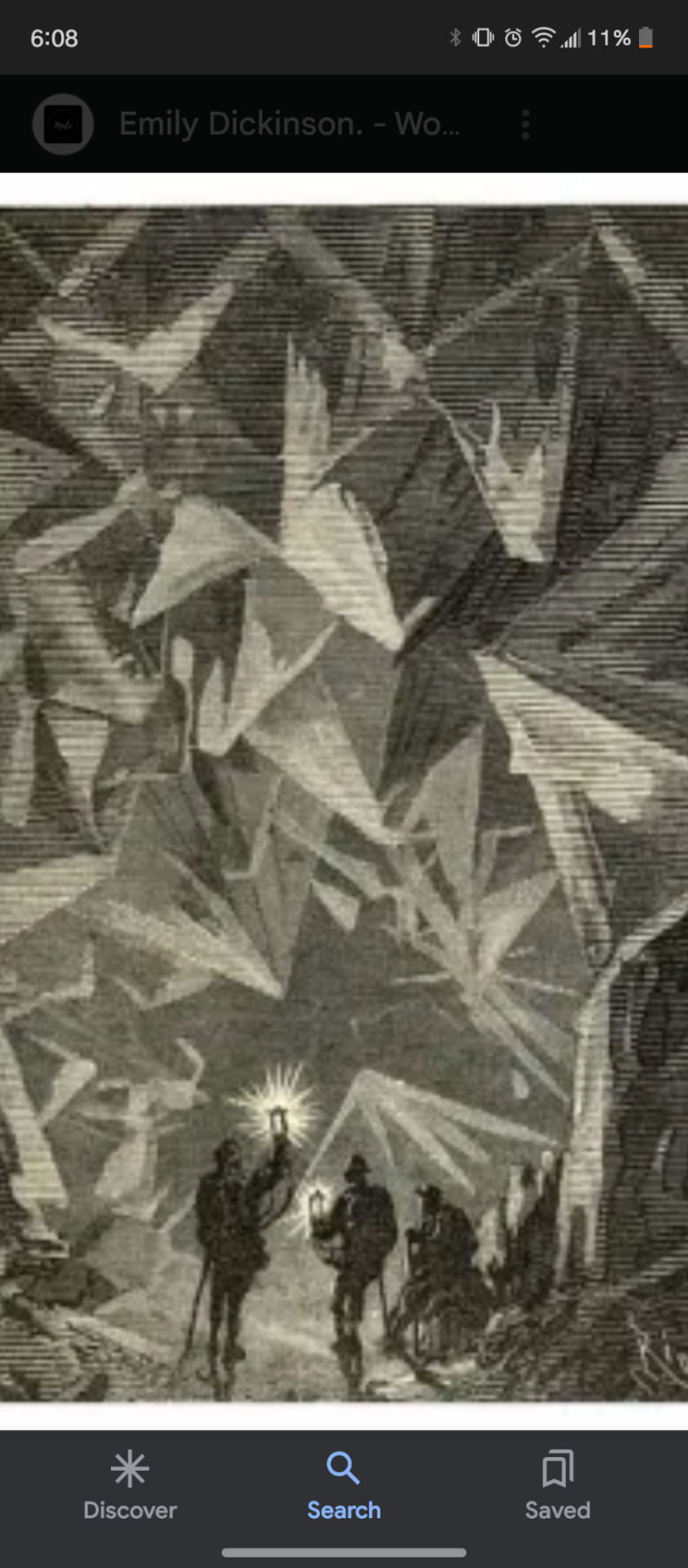



Pics:
1. The explorers in a Cave of Giant Diamonds - much too large to carry off!!
2. Our heroes find the Fields of Giant Mushrooms!
3. The rocky shore from where the wide sea will be crossed.
4. I love the attention that the artist spent on the underground ecology.
Author: Jules Verne was a French writer that helped (H.G. Wells) to lay the foundations of modern sci-fi.
His father wanted Jules to become a lawyer. But, Verne fell in love with literature.
Jules worked as a secretary - while writing plays & short stories. Verne dreamt of a genre where he could mix scientific facts with adventure tales.
In 1862, Jules published his 1st novel "Five Weeks in a Balloon" - an international bestseller!
For this, Verne was offered a long term contract, to write more scientific adventures...
This would lead to a 40+ year career & 60+ successful works.
But, after 1886, Jules became more pessimistic. With stories exploring the dangers of "high tech" made by hubris filled scientists...
Personal problems with Verne's own son & financial difficulties forced him to sell off his priced yacht.
Then, the deaths of his mother & mentor left Jules emotionally bereft...
Verne even got shot (in the leg!) - by his own nephew!! This left him partly crippled.
Jules fell sick weeks after his 78th birthday. Burdened by diabetes & a stroke, Verne died quietly - with his family around him.
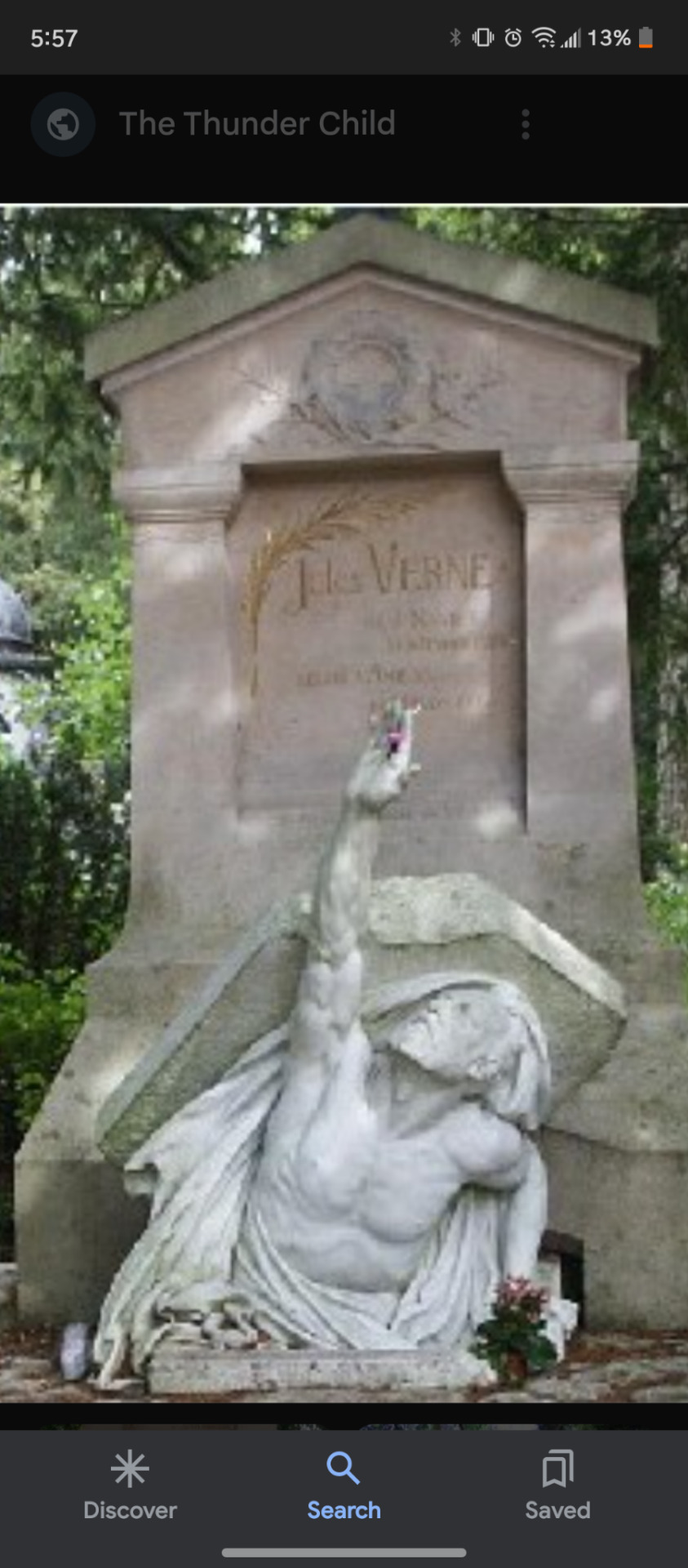
Pic: The beautiful headstone/monument for another dreamer gone on to the Underworld...
Criticism: This classic adventure novel is not a long book. But, it holds an amazing amount of fast paced action & a well constructed plot.
Its main theme is the quite common 1 of perseverance in the face of any hardship - even to ignoring all reason!
Though it takes it's time setting every thing up, once it gets going, 1 can't put it down.
Legacy:
1. When Jules Verne died, he left behind a drawerful of almost finished manuscripts. When finally published, it was found out that his son had rewritten them!
He had changed the stories' style & added characters to make these last tales more melodramatic.
Most critics condemned these works - for being 'contaminated'...
2. "Journey to the Center of the Earth" has been adapted into film several times: 1910, 1959, 1988 & 2008.
3. It's also been turned into a late 1960s Filmation/20th Century Fox cartoon & a TV series in 1977.
4. At the Tokyo/Disney theme park, there's a "Journey" slot car 'dark' ride based on Jules' story - visit today...
0 notes
Text
The Rise of Dystopian Literature: Why We Are Drawn to Stories of Dark and Disturbing Futures
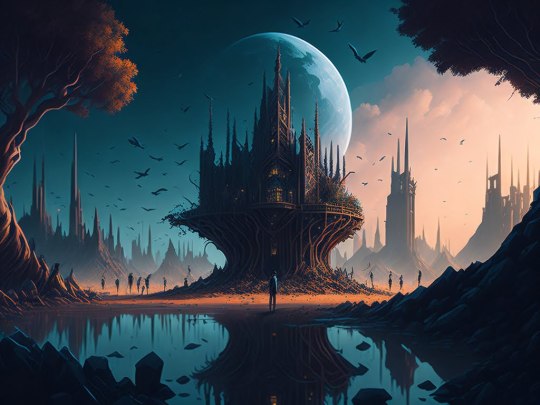
Outline:
I. Introduction
- Definition of Dystopian Literature
- The Growing Popularity of Dystopian Themes
II. Historical Roots of Dystopian Literature
- Early Examples and Influences
- Evolution of Dystopian Narratives
III. Characteristics of Dystopian Novels
- Common Themes and Elements
- Exploration of Societal Issues
IV. Impact of Dystopian Literature
- Shaping Cultural and Social Discourse
- Influence on Popular Culture and Media
V. Influential Dystopian Novels
- 1984 by George Orwell
- Brave New World by Aldous Huxley
- The Hunger Games by Suzanne Collins
- The Handmaid's Tale by Margaret Atwood
VI. Themes Explored in Dystopian Literature
- Surveillance and Loss of Privacy
- Totalitarian Governments
- Struggle for Individuality and Freedom
VII. The Allure of Dark and Disturbing Futures
- Human Fascination with Worst-Case Scenarios
- Reflection of Contemporary Fears and Anxieties
VIII. Dystopian Literature in Modern Education
- Inclusion in School Curriculums
- Encouraging Critical Thinking
IX. Dystopian Literature vs. Reality
- Parallels with Contemporary Issues
- Warning Signs and Societal Reflection
X. The Role of Technology in Dystopian Narratives
- Surveillance Technology in Literature
- Real-World Implications
XI. The Power of Dystopian Imagination
- Inspiring Change and Activism
- Catalyst for Social Awareness
XII. Criticisms and Controversies Surrounding Dystopian Literature
- Accusations of Dystopian Fatigue
- Ethical Concerns Regarding Graphic Content
XIII. Conclusion
- Recap of Dystopian Literature's Impact
- Continuous Relevance and Future Prospects
XIV. FAQs (Five Unique Questions)
- Is dystopian literature suitable for all age groups?
- How does dystopian literature differ from other speculative fiction genres?
- Can dystopian novels serve as a form of social commentary?
- Are there any emerging trends in contemporary dystopian literature?
- What makes dystopian literature a powerful tool for discussing societal issues?
The Rise of Dystopian Literature: Why We Are Drawn to Stories of Dark and Disturbing Futures
Introduction
Dystopian literature, characterized by nightmarish visions of the future, has witnessed a significant surge in popularity in recent years. This genre explores unsettling societal structures, oppressive governments, and the human struggle for survival. As we delve into the rise of dystopian literature, it's essential to understand the roots of this captivating genre and its enduring impact on readers.
Historical Roots of Dystopian Literature
Dystopian narratives have historical roots, with early examples found in works like "The Time Machine" by H.G. Wells. Over time, dystopian literature evolved, with authors weaving intricate tales that reflected contemporary fears and anxieties. The genre became a powerful medium to comment on societal issues, offering both cautionary tales and imaginative escapes.
Characteristics of Dystopian Novels
Dystopian literature shares common themes such as totalitarian regimes, loss of individual freedoms, and surveillance. These novels often serve as a lens through which readers can examine and critique societal norms. The exploration of dystopian worlds allows for a deeper understanding of the human condition and the consequences of unchecked power.
Impact of Dystopian Literature
Beyond entertainment, dystopian literature shapes cultural and social discourse. Influencing popular culture, movies, and television, dystopian narratives often transcend the pages of books, impacting how we perceive and navigate our own world. This influence extends to education, where dystopian novels are integrated into curriculums to provoke critical thinking.
Influential Dystopian Novels
Certain dystopian novels have left an indelible mark on literature and society. George Orwell's "1984," Aldous Huxley's "Brave New World," Suzanne Collins' "The Hunger Games," and Margaret Atwood's "The Handmaid's Tale" stand out as pillars of the genre, each exploring unique facets of dystopian themes.
Themes Explored in Dystopian Literature
Dystopian literature delves into recurring themes like surveillance, totalitarian governments, and the struggle for individuality. These themes resonate because they reflect genuine societal concerns, making dystopian narratives relatable and thought-provoking.
The Allure of Dark and Disturbing Futures
Readers are drawn to dystopian literature because it offers a glimpse into worst-case scenarios. The genre taps into human fascination with disaster, providing a space to explore fears and anxieties in a controlled setting. By examining these dark futures, readers can confront and, to some extent, prepare for potential challenges.
Dystopian Literature in Modern Education
The inclusion of dystopian literature in school curriculums enhances education by encouraging critical thinking. Students analyze complex societal structures, question authority, and draw parallels between dystopian narratives and real-world issues, fostering a deeper understanding of the complexities of human society.
Dystopian Literature vs. Reality
Dystopian literature often mirrors contemporary issues, acting as a warning sign for potential societal pitfalls. The genre prompts readers to reflect on the present, recognizing parallels between fictional dystopias and real-world challenges. This connection fosters awareness and, in some cases, inspires action.
The Role of Technology in Dystopian Narratives
Advancements in technology have become integral to dystopian narratives, with surveillance and loss of privacy playing central roles. Dystopian authors explore the implications of technology on society, offering insights into potential future scenarios that resonate with our current dependence on digital surveillance.
The Power of Dystopian Imagination
Dystopian literature goes beyond entertainment; it inspires change and activism. By presenting alternative futures, authors challenge readers to question societal norms, fostering a sense of agency to shape a better world. Dystopian imagination becomes a catalyst for social awareness and, potentially, positive transformation.
Criticisms and Controversies Surrounding Dystopian Literature
Despite its influence, dystopian literature faces criticisms, including accusations of dystopian fatigue and concerns about graphic content. Some argue that the genre's prevalence may desensitize readers to its warnings. Ethical considerations regarding the portrayal of violence and distressing scenarios also spark debates within literary circles.
books that changed my life
Embarking on a literary journey is not merely an act of reading; it's a transformative odyssey that has the power to shape our perspectives, challenge beliefs, and leave an indelible mark on our souls. As I reflect on the books that changed my life, I find myself immersed in a kaleidoscope of narratives that have altered the course of my understanding and enriched the tapestry of my experiences.
One such life-altering encounter was with Viktor Frankl's "Man's Search for Meaning." This profound exploration of human resilience, drawn from Frankl's experiences in Nazi concentration camps, instilled in me a newfound appreciation for the strength of the human spirit and the pursuit of purpose even in the face of unimaginable adversity.
Haruki Murakami's "Norwegian Wood" served as a poignant companion during moments of introspection. Its exploration of love, loss, and the delicate threads that connect us all resonated with the nuanced emotions I grappled with, offering solace and a deeper understanding of the human condition.
The philosophical musings of Hermann Hesse in "Siddhartha" guided me on a quest for self-discovery and spiritual enlightenment. The protagonist's journey echoed my own quest for meaning and purpose, prompting moments of introspection that reverberated long after the final page.
"1984" by George Orwell, a dystopian masterpiece, acted as a stark warning about the perils of unchecked power and the erosion of individual freedoms. Its chilling portrayal of a totalitarian regime left an indelible imprint, fostering a vigilant awareness of societal structures and the importance of safeguarding liberty.
Each book, a literary gem, has left an enduring legacy on my consciousness, shaping my thoughts, values, and understanding of the world. The transformative power of literature lies not just in the words on the page but in the profound impact it has on the reader's journey through life.
Conclusion
In conclusion, the rise of dystopian literature is not merely a trend but a reflection of our collective fascination with exploring the unknown, challenging societal norms, and contemplating the consequences of unchecked power. The enduring appeal of dystopian narratives lies in their ability to provoke thought, inspire change, and serve as cautionary tales for the complex world we inhabit.
FAQs (Five Unique Questions)
What are the 5 traits of dystopian literature?
Dystopian literature manifests through vivid characteristics that paint a bleak picture of the future. Typically, these traits include oppressive government control, societal dehumanization, environmental degradation, surveillance, and the suppression of individual freedoms. These elements collectively create a nightmarish vision of a world gone astray.
What is the most famous dystopian text ever written?
Undoubtedly, George Orwell's "1984" stands as the epitome of dystopian literature. Published in 1949, Orwell's masterpiece envisions a totalitarian regime, Big Brother's omnipresent surveillance, and the manipulation of truth, leaving an indelible mark on the genre and society's collective consciousness.
What describes dystopian?
Dystopian, derived from the Greek words "dys," meaning bad, and "topos," meaning place, encapsulates an imagined society characterized by oppressive social, political, and environmental conditions. These bleak settings often serve as cautionary tales, exploring the consequences of unchecked power and societal complacency.
What are the 4 types of dystopias?
Dystopias come in various shades, with common types being totalitarian, corporate, ecological, and technocratic. Totalitarian dystopias feature oppressive governments, corporate dystopias showcase unchecked corporate power, ecological dystopias depict environmental collapse, and technocratic dystopias explore the dark side of technological advancement.
What is a book that has changed society?
Harriet Beecher Stowe's "Uncle Tom's Cabin" is a pivotal work that significantly altered societal perspectives. Published in 1852, this anti-slavery novel ignited fervent discussions, heightened awareness of the horrors of slavery, and played a substantial role in galvanizing the abolitionist movement.
How has literature changed the world?
Literature acts as a mirror and catalyst for societal change. It sparks critical conversations, challenges norms, and fosters empathy. Books like "To Kill a Mockingbird" by Harper Lee and "The Diary of Anne Frank" have influenced public discourse, fostering social awareness and advocating for justice.
What is the most influential book in American history?
"The Federalist Papers," a collection of essays by Alexander Hamilton, James Madison, and John Jay, profoundly influenced American history. Penned in the late 18th century, these essays played a crucial role in shaping the U.S. Constitution, providing insights into the framers' intentions and political philosophy.
Which book is the most powerful book in the world?
"The Bible" is widely considered one of the most powerful and influential books globally. Its impact transcends religious boundaries, shaping cultural, ethical, and literary landscapes. Its narratives and teachings have left an enduring imprint on human history and continue to inspire countless individuals worldwide.
Read the full article
#6elementsofdystopianfiction#Booksthatchangedtheworldofliteraturepdf#booksthatchangedtheworldpdf#dystopianliteratureanalysis#Dystopianliteratureauthors#Dystopianliteraturebooks#Dystopianliteraturecharacteristics#dystopianliteratureexamples#dystopianliteratureineducation#Dystopianliteraturepdf#Dystopianliteraturesummary#dystopianliteraturevs.utopianliterature#dystopiannovelsforyoungadults#dystopianthemesandsymbolism#emergingdystopianauthors#exploringdarkfuturesinliterature#Famousdystopianliterature#Fictionbooksthatchangedtheworldofliterature#futuristicdystopiannovels#impactofdystopiannarratives#mostinfluentialbooksofalltime#mostinfluentialbooksofthe21stcentury#societalcritiqueindystopianfiction#thebookthatchangedtheworld#top10mostinfluentialbooksintheworld
0 notes